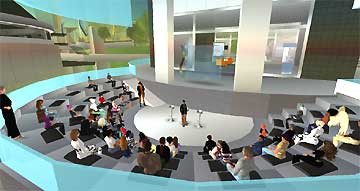Immersive Education Summit Ad-Hoc Meeting
3 February, 2008

Well I couldn’t resist. Aaron E. Walsh sent out an invitation to the Squeak – Croquet communities for an ad-hoc Immersive Education Meeting. The Boston Digital Summit held in January covered the Education Grid, this meeting was a chance to review this information for those that were not able to make it to the summit.
Second Life was quite an experience. I had to sign up and go through some training, figure out how to get to Sun’s virtual auditorium and sit down. It was quite amusing to see some people show up on stage and not know how to sit down either, so I didn’t feel so bad. Maybe I should have spent more time in the training.
Aaron, reviewed the details of the Education Grid. The Grid is an education content virtual repository focused on interoperability, standards, and quality educational content. The goal is to provide standards that allow content to be developed to operate in different virtual worlds. These standards must be open source to ensure that content can be made freely available.
Content is just a piece of the puzzle in education. Educators also need tools to be able to evaluate the progress of students. There are a number of general tools that should be developed and made available in a consistent way for each offering. Aaron mentioned, “While it is possible to record everything that happens in a virtual world there is no way an educator could watch everything a student did in an activity that might take 2 hours.” Tools that allow educators to evaluate raw data, to assess progress and to track grades, and to create content are essential.
Quality content will be assured by having a Peer Review of offerings before the become part of the grid. The peers will be selected from the community and people with special expertise will be sought to make sure that the education goals are met, the content is accurate, standards are followed, and licensing is compatible to be a part of the grid.
Licensing and interoperability were the major concerns once Aaron opened the floor to questions. Ownership of the content was also discussed. Aaron mentioned that a not-for-profit organization would own the grid, but that the grid would be virtual and would be hosted by multiple organizations. I’m not sure there was a full answer about the ownership of the content. I would have suggested that copyright stay with the author or developing organization, and that the grid would receive unlimited rights to distribute the content, much in the same way were are trying to organize the Squeak community.
Well I ran out of time but Aaron did a very nice job of wrapping it up just a few minutes over. Thank you! The concept is really a terrific idea. I hope that our communities will join together and support developing freely available virtual world educational materials. Aaron mentioned that other meetings will be held in Croquet, I look forward to that. I hope to see you there. Hopefully that meeting will be just as well attended as the SL meeting.
Immersive Education the focus of 2008 Boston Summit (January 12-13 at Boston College)
3 January, 2008
From Aaron E. Walsh:
Happy New Year, everyone. As we enter 2008 I’m happy to announce that the Boston Digital Media Summit (next weekend) is focused on Immersive Education and will feature Croquet in several sessions (see the schedule of events below; Julian’s keynote is on Day 1 — January 12th).
Please join us if you’re in the Boston area or would like to make a trip for the event. The news release is below, and I’ve attached the PDF version as well.
It’s also in HTML format along with related news items at:
http://ImmersiveEducation.org/#NEWS
The Summit schedule of events has been set, which you can also see at:
http://mediagrid.org/summit/ (main page)
http://mediagrid.org/summit/program.html (schedule of events)
Best regards,
Aaron
Virtual Education a Reality for Aaron E. Walsh
10 December, 2007
![]()
The Federation of American Scientists and the Kauffman Foundation are backing the Boston College’s own Aaron E. Walsh efforts to build virtual reality education content for virtual worlds like Croquet, Second Life and Project Wonderland.
Walsh has been focusing on delivering content to children with disabilities through the Grid Institute an organization that promotes the use of a public utility grid to develop and deliver high-end virtual reality and 3-D simulation programs.
This new multi-million dollar project called Immersive Education promises to bring together an international group of educators, researchers and companies along with foundations to develop standards and technologies that will enable a much richer interactive 3-D educational experience.
The award winning Immersive Education software, now on it’s third generation was originally only available for university students. The project was started in 2004 at Boston College. The software is now available as an open standard for educational software. Visit immersiveeducation.org for more information.
